Why does Liverpool lose its brightest and its best?
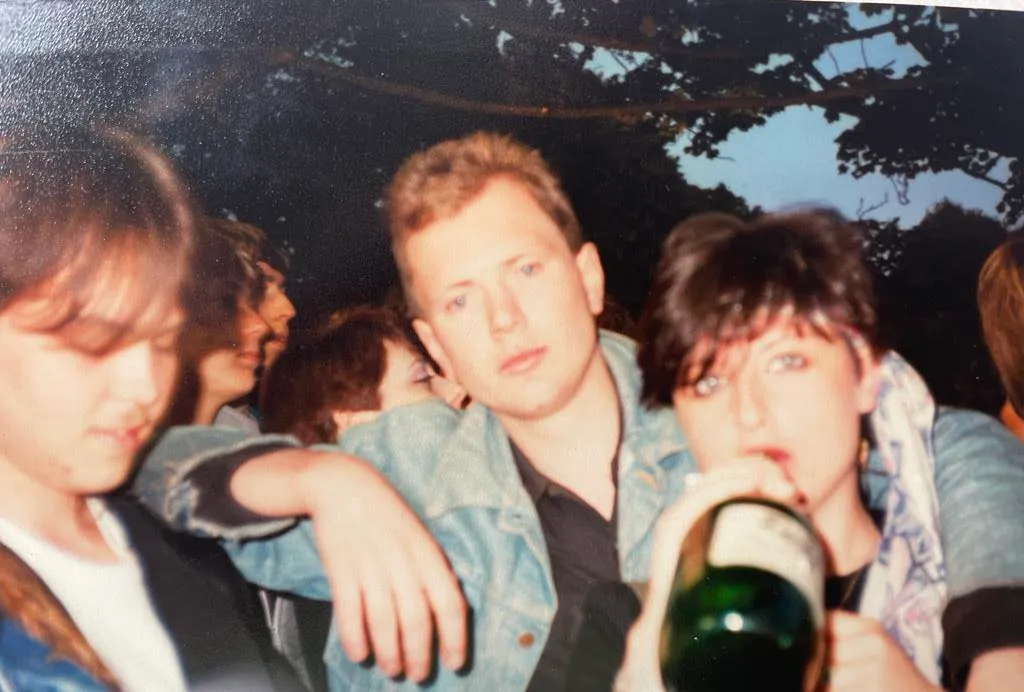
On a city that can’t stop breaking my heart
Two cities. Two huge buildings, both mostly filled with empty air. One deliberate. One desperate.
I’m thinking of the speculative dreams of Paddington Village and its tenant-hungry Spine building as I walk around the quarter-of-a-billion pound soft play area of the Kusama retrospective in Manchester’s Aviva studios hangar.
What is this feeling I’m getting, standing beneath a huge inflated pumpkin in yet another audaciously aggressive new Manchester venue funded by, well, us mostly. Across town, the UK’s largest-ever entertainment venue is taking shape alongside the Etihad stadium. In the other direction, the galleries and theatres of Home.
Like all conscientious therapy patients I am allowing my responses to bubble up. I’m leaning in to them and making gentle enquiries. Am I jealous? Am I angry? I lock onto it. It’s not envy. It’s sadness. It’s a realisation that the foundations for buildings like these reach all the way to the other end of the M62. And they were given the green light 40 years ago. In Liverpool.
I have no working estimate of how many holes it takes to fill the Albert Hall, but I do know that if you rounded up everyone who left Liverpool from the 80s to the start of the millennia, they’d fill Aviva’s (I refuse to call it Factory anything any more) cavernous hall five times over. Assuming they all squeeze in, and they’re allowed to puncture the Kusamas.
Yes, yes, yes — I know. All cities churn. And most cities have downsized as people move to the suburbs. But Liverpool’s lost more than most. Over 100,000 left between 1971 and 1981. A further 8% skedaddled in the 90s, and between 2001 and 2006, the city experienced the ninth largest population percentage loss in the country. That’s not a trickle, it’s a pyroclastic flow.

But it’s not about the numbers, is it? It’s never about the numbers. Numbers can tell you anything you want them to. And you might have different ones at your disposal. It’s about who left, what made them, who’s still leaving, and why.
Perhaps, also, it’s about what could have happened if they’d stayed.
From the playpen politics of Militant and the managed decline of Thatcher, to the mates rates and special measures of recent years, Liverpool has not been served well by its public servants, each successive regime hellbent on a rival experiment in social policy. You may disagree, you may not: but this is about me. And my numbers speak for themselves.
In the 80s, over half of my friends went to London and carved out happy, successful careers, raised families, made new connections and softened their vowels. Two went to Milford Haven and were never heard of again.
Then, as the decade matured, and the city’s garden festival site blossomed into rubble and rows, I studied for a degree at Alsager in deepest Cheshire, after which my new batch of friends left me too: this time to Manchester. Here, too, they carved out happy, successful careers, raised families, made new connections, started businesses and never admitted they came from Cheltenham Ladies College or Hertford. No, they were all proud northerners now.
The exodus continued well into the 90s, when Liverpool was so destitute it qualified for a billion pounds of Objective One cash from Europe. My friend who became a magazine designer in London because there was nothing for her to design here. My friend who’s managing a huge event space in London because there was nothing for him to programme here, my friend the camera operator in Manchester because a million years later we’re still waiting for the Littlewoods building to turn into the Hollywood of Edge Lane, the food stylist, the fabric designer, the engineer, the architect, the concierge, the software developer, the ice-cream maker and the sound engineer. All gone.
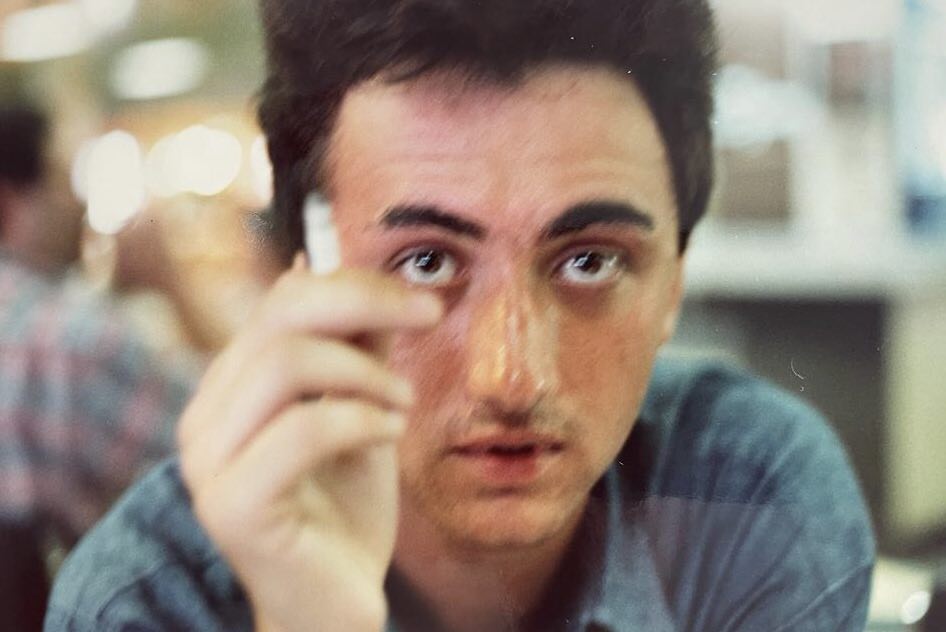
Friends whose new business started to blossom but, without the support it needed to thrive, moved to London, Manchester or other cities whose opportunities matched their ambitions. And now, their kids are London kids, or Manchester kids or Sydney kids or Cambridge kids. And so the ripples widen, and the lost generation doubles.
Because none of this is really about massively over-budget events spaces, grade A offices, shopping malls or concert venues. Cities are built by people. Random connections. The alchemy of chaos and chance. And, no matter how you shake up the numbers, if you lose hundreds of thousands of your brightest, most ambitious and determined souls, those connections aren’t made, and a million possible futures just don’t happen. They will never happen. Because they’re happening elsewhere instead.
What happens instead is a subtle shifting of emphasis, a mutation in our make-up and a narrowing of expectations. The city becomes a little more inward looking; wary, fretful and unsure of its place in the world.
You see gay friends shunned from a city of a million microaggressions, watching Liverpool’s gay village atrophy while Canal Street bloomed, you see sharp new sportswear companies move out because our talent pool is shallower than a petri dish, and you see (as I saw when I edited Liverpool’s inward investment magazine a decade ago) the same handful of success stories stuck on repeat. Honestly, I wrote about the Bac Mono sports car so often I should have shares in it. Just recently they’ve been slapped on a billboard in Scottie Road. This is ten year old news, people. Our singular success story.
You get a mayor whose ambitions amount to a new stadium for his football team because, well, football. An asphalt academy. An Amazon logistics HQ. A mayor who was offered, on a plate — investors all lined up and ready to go — a huge Barcelona-style food market, stained glass, cast iron, the works, behind the Municipal Buildings in Victoria Street. Way before Baltic and Duke Street and every other city’s food markets. His response? No one wants that sort of thing here. Can’t you do something in St Johns precinct?
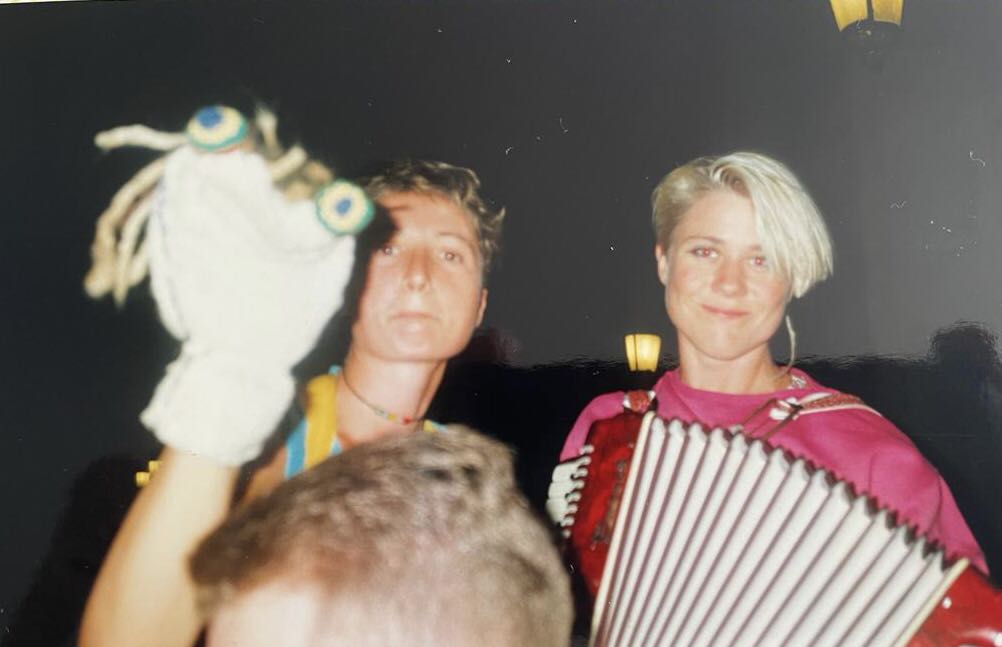
What did we get instead? A half empty car park in Victoria Street and a dying market. How many start-ups have either generated?
It’s amazing to me how normalised this exodus, this rite of passage out of here, became. When I was growing up, it was just the thing that you had to do. If you wanted to get ahead, you had to jump on a train at Lime Street and seek success elsewhere.
Of course, some might say that Manchester has lost its soul — its very Manchesterness — in its reinvention, and that Mancunians have been priced out of places like Ancoats and the Northern Quarter: and, with them, the energy and character that made the city great.
It’s true that the Manchester I lived in — briefly — 20 years ago is long gone. Buried beneath spindly thickets of get-rich-quick offshore investment schemes masquerading as apartment blocks. But it’s also hard to argue against a city with rampant population growth: 30% in the past two decades. And, underneath those skyscrapers, hundreds of new bars, shops and start-up adventures are unfolding — and with them, thousands of new jobs. The city’s building a generation of new Mancunians. A myriad of possible new futures.
Meanwhile, most of Liverpool’s offshore investment schemes have stalled while the developers await further police enquiries, or scrabble for more funds when their ludicrously highly-leveraged houses of cards collapse.
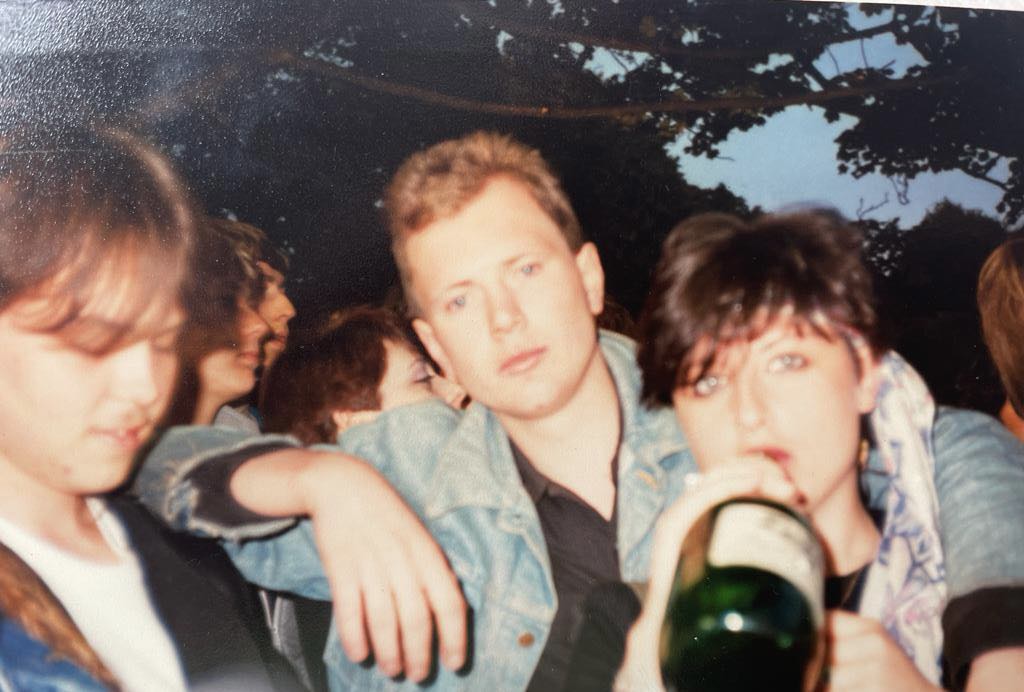
And this is the point when people start going on about how Liverpool still feels very Liverpool, and what a precious and rare gift this is. Of how, in some corners, the suburbs actually bite into the city centre itself. Look, you can see the rich street life of Kenny from the empty floors of the Spine Building. Isn’t that thrilling? So real.
The Liverpoolness of Liverpool is a decoy. It’s a lazy distraction. Which Liverpool are we talking about anyway? The glory days of Cream? The crystal days of Erics and Echo and the Bunnymen? Or golden days of diphtheria and Doctor Duncan? The people who spout this shit the most are the ones who visit a couple of times a year for the match and get misty eyed watching Brookie repeats. The people who’d really love to come back to look after their old mum, if only they could get a decent croissant in Croxteth. Or, worse, the ones you meet walking the dog: “Yeah, we sold our flat in Hammersmith and bought a little place up here. What’s it called again Jamie? Oh yeah, West Derby.”
If you were to build a replica, brick by brick, of Liverpool circa 1962, and placed it somewhere out in the fields around Billinge, would that be more Liverpool than this Liverpool? Of course not. Cities are about continuity through change. There is no other point to them. What if Manchseter did the same: a brick by brick simulacrum of the city one second before the bomb went off? Would that be more Manchester than the plate glass facades of New Cathedral Street? And would anyone want it? Really?
I doubt it. All they want (and all they’ve got) is an ersatz strip of recycled bricks running along the bar in the polished concrete atrium of Aviva Studios — a hamfisted nod to the fact that you’re standing above the cobbles of Coronation Street, and with each new MIF retrospective, your On cloudflow trainers are pushing them deeper into the dirt. And that’s exactly the way it should be.
You couldn’t get more Liverpool than the Museum of Liverpool. It’s wall to wall Cilla and Shankly and slave traders in there. But is this what we want to cling on to when bright, ambitious 21st-century Scousers leave to grow their sportswear brands down the other end of the East Lancs road?
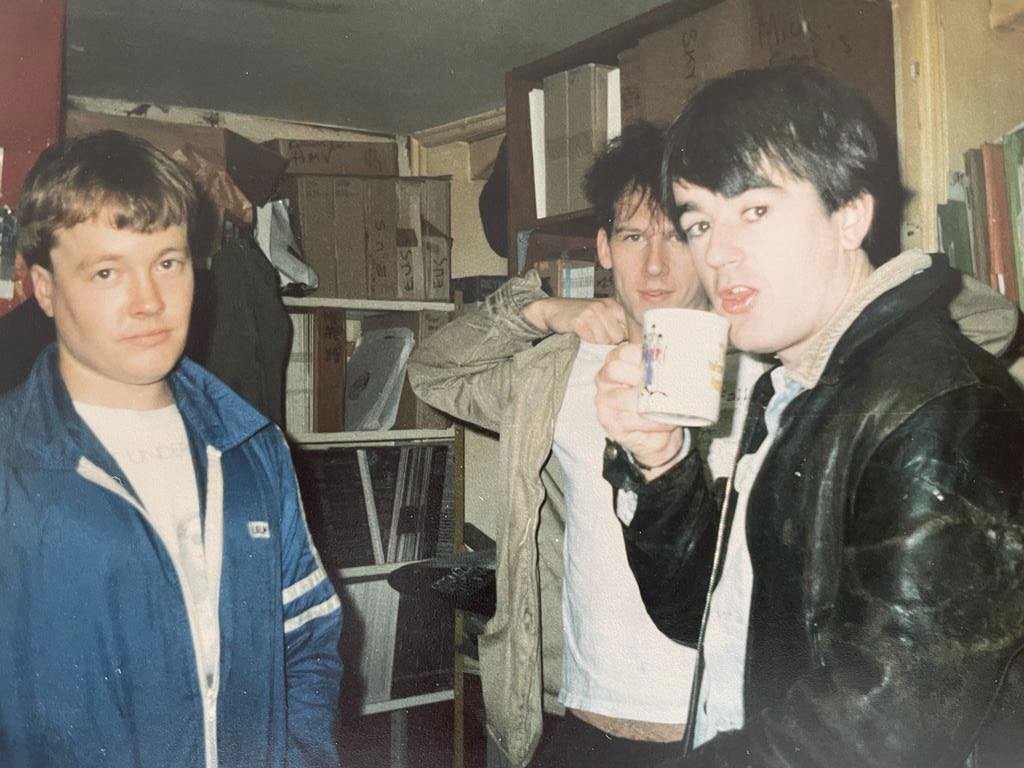
Feeding into this fear of losing our sense of ourselves, our leaders have for too long been paralysed by a sense that aspiration is anathema to our working class roots. We know our place. Let’s not get all flat white when a milky Nescafe in Sayers is who we really are.
But then, this spring, something happened. One of those spine-tingling (if not Spine-filling) moments we witness every few decades. For two weeks in May the city remembered its true vocation. We know how to make people happy. We know that we’re all fighting for our lives, that we’re all working ourselves into the absolute ground, and that we’re social animals hungry for connection.
From where I’m slouching, these are the metrics that matter these days.
If Eurovision taught us anything (apart from the fact that the best song never wins) it’s that the city can throw the best parties, and knows how to tap into a deeper truth: that Grade A offices aren’t full of blue chips and incubator hubs, they’re full of people.
Two weeks in May isn’t the answer, of course. But faced with the eternal chicken and egg of ‘no talent pool means no businesses’, and ‘no businesses means no talent pool’, we have to light the touchpaper somehow. And just maybe throwing the best-ever parties — and inviting everyone — might be even more audacious than building the biggest arts venue after all.
It’s a way to say, hey, look over here — Liverpool is a city powered by people. But can we be brave enough to realise it?
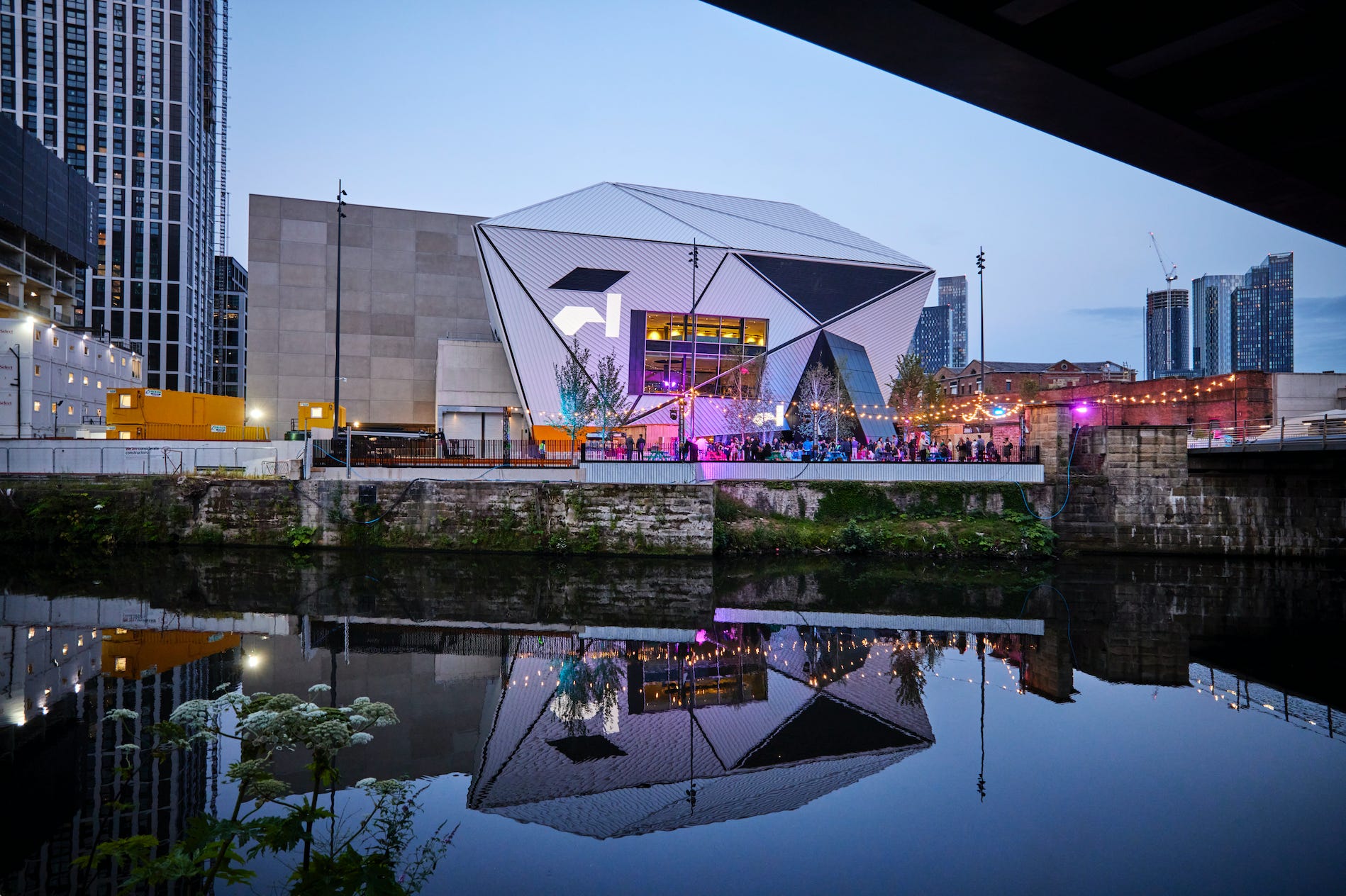
Just as I was packing up to leave Manchester in 2005, I met a friend who’d quit her decent job in London, and was relocating to the city. “I’m starting this new bi-annual arts festival,” she told me, in a tiny office on Portland Street. I wished her well, but couldn’t help feeling the region didn’t need a new arts festival. Didn’t we already have the Biennial in Liverpool?
Now, 18 years later, I’m standing in its new supersized HQ and remembering that conversation. “They’re really determined to make it work,” Christina said of Manchester Council, who’d lured her north. “They’re throwing everything at it.”
Well, they did it. Aviva Studios’ complex, bullish and contrary geometry looks right at home in the bullish and contrary new Manchester.
This spring, we threw everything at it too. It felt like we were awaking from a long, medically-induced coma. Like we suddenly remembered why some of us chose to stay (and plenty of brilliant people did, let’s make that clear). Keep the momentum up and there’s no reason in the world why disruptor companies — such as Starling bank, who recently opened up an office in, oh guess where, Manchester, won’t start to look again at us. And no reason at all why those of us who now work at home won’t see a city’s attributes start to stack up differently. A shifting of priorities towards the stuff we’ve always been good at.
Liverpool, more than any other city I know, has a terrifying capacity for self harm. But we have an indestructible ability to come together, as one, and show people what we’re really made of. “Fair play to Liverpool,” said one Glasgow Twitter comment during May’s festivities. “No one could have pulled this off better than Liverpool. Not even us.”
So what happens next? No city could capitalise on it, or crush it dead, better than Liverpool.

Comments
Latest
Merseyside’s buses are coming back into public hands. Why not trains too?
From Jimmy McGovern to Len McCluskey: The household names rallying behind Writing On The Wall’s employees
The lost department stores of Liverpool
Last minute drama, local revamps and Liverpool Doc Club
Why does Liverpool lose its brightest and its best?
On a city that can’t stop breaking my heart